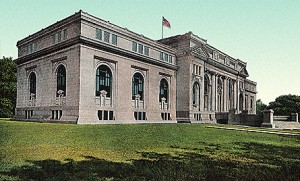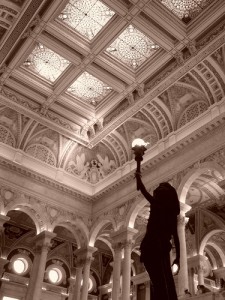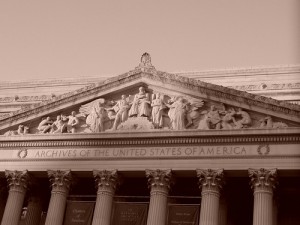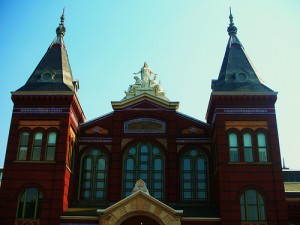Alexandria Public Library
The Alexandria Library was founded in 1794 and has four branches.
The Alexandria Library was founded in 1794 and has four branches.
The Alliance Francaise of Washington offers a lending library for members, with print and multimedia materials in English and French.
The AIA maintains an extensive circulating library of books on architecture, design, and construction; non-members can purchase annual borrowing privileges.
Arlington maintains public libraries in eight County locations.
The AARC acquires, preserves, and provides information on political assassinations. Open by appointment.
This all-volunteer community library is located in the basement of the Church of the Nazarene, and opened in February 2012. Hosts readings, films, community meetings. Has internet access and over 9,000 books.
The National Society of the Daughters of the American Revolution maintains one of the largest geneological libraries in the world.
With 26 locations, the DCPL has extensive collections, offers public programs, and maintains special collections in DC History, the History of Georgetown, and African American History. Of special interest is the library’s online exhibit, “The Black Renaissance” and “DC By the Book,” an interactive map of literature set in the city.
Dumbarton Oaks is a research institution associated with Harvard University. They operate a museum of Byzantine and Pre-Columbian art, maintain magnificent historic gardens, and run a research library.
Fairfax County maintains 22 library locations, and co-sponsors the annual Fall for the Book Festival (typically in September or October).
The Foundation Center runs a non-circulating library with information on foundations, corporate giving programs, and government grants in the US and abroad. Provides resources for non-profit organizations and for individuals seeking financial support. Offers classes in fundraising. DC is the location of one of their five sites across the US.
The German Historical Institute of Washington maintains a free, public, noncirculating library collection. Specializes in materials on German history, and German-American relations.
 The Historical Society maintains the Kiplinger Library, a research collection of DC history. They also host exhibitions and special events, publish the journal Washington History, and co-sponsor the annual DC Historical Studies Conference.
The Historical Society maintains the Kiplinger Library, a research collection of DC history. They also host exhibitions and special events, publish the journal Washington History, and co-sponsor the annual DC Historical Studies Conference.
 The LoC is an amazing resource. Information on the extensive collections (books, manuscripts, maps, photographs, prints, recordings, etc.), as well as the numerous public programs including readings and films and author talks. Special features of the site include “This Day in History”; web exhibits on such topics as Thomas Jefferson, Russia, and Bob Hope; the American Memory section with connections to original reference materials; a children’s section, “The Poet and the Poem” webcasts, the Archive of Recorded Poetry and “Poetry 180,” an initiative begun by former poet laureate Billy Collins to provide daily poems designed to be read by high school students. LoC Publications prints books, catalogues, and pamphlets about the library and its holdings. Also of special interest is the National Book Festival, the Center for the Book, with affiliated centers across the nation, the US Copyright Office, and the Office of the US Poet Laureate.
The LoC is an amazing resource. Information on the extensive collections (books, manuscripts, maps, photographs, prints, recordings, etc.), as well as the numerous public programs including readings and films and author talks. Special features of the site include “This Day in History”; web exhibits on such topics as Thomas Jefferson, Russia, and Bob Hope; the American Memory section with connections to original reference materials; a children’s section, “The Poet and the Poem” webcasts, the Archive of Recorded Poetry and “Poetry 180,” an initiative begun by former poet laureate Billy Collins to provide daily poems designed to be read by high school students. LoC Publications prints books, catalogues, and pamphlets about the library and its holdings. Also of special interest is the National Book Festival, the Center for the Book, with affiliated centers across the nation, the US Copyright Office, and the Office of the US Poet Laureate.
The Middle East Institute maintains the George Camp Keiser Library, which houses a comprehensive English language collection on the Middle East.
Montgomery County maintains 21 public libraries.
The Moorland-Spingarn, housed at Howard University, is one of the best research collections in the world on African American history and culture.
 The National Archives and Records Administration has collections of government records, including census and military records. They maintain a museum, offer free geneology workshops, and host films and lectures.
The National Archives and Records Administration has collections of government records, including census and military records. They maintain a museum, offer free geneology workshops, and host films and lectures.
The National Gallery is a renowned museum of visual art, with two buildings (an East and a West wing), and an outdoor sculpture garden. They also maintain an art research library, and sponsor tours, films, and lectures.
National Geographic hosts a museum, films, lectures, and concerts. They also maintain a library with a public reading room.
The National Institutes of Health maintains the largest medical library in the world in Rockville, MD. They also offer rotating exhibits.
The OAS maintains a museum, an outdoor sculpture garden, and a resource collection, the Columbus Memorial Library.
The Biblioteca Catalana is the library of the Pauli Bellet Foundation, housed on the second floor of Kensington Row Bookshop in Kensington, MD.
The Polish Library is a membership organization with a circulating library serving the Polish community as well as others interested in Polish literature, culture, history, and present-day Poland.
The Prince George’s County Memorial Libraries operate in 19 locations.
The massive Masonic Temple in DC offers tours and exhibits, and maintains a research library that was the first public library in DC.
 The Smithsonian Institution maintains 22 libraries to complement their museum collections, and offer a range of online exhibits. Of special note are the Dibner Collection on science and technology, and the Cullman Collection on anthropology and the natural sciences.
The Smithsonian Institution maintains 22 libraries to complement their museum collections, and offer a range of online exhibits. Of special note are the Dibner Collection on science and technology, and the Cullman Collection on anthropology and the natural sciences.
The Society for Women Geographers is a membership organization. They maintain a research library, open by appointment.
The Society of the Cincinnati operates Anderson House, with mansion tours, lectures and concerts. They also maintain a library, open to researchers by appointment, on the people and events of the American Revolution.
The Textile Museum at The George Washington University maintains the Arthur D. Jenkins Library of Textile Arts, with literature and visual resources. While international in scope, the holdings emphasize the traditional cultures of the Americas, Africa, and Asia.
The USGS has the largest earth science library in the world, with collections in the areas of geology, hydrology, cartography, and biology, in four locations: Denver, Flagstaff, Menlo Park, CA, and Reston,VA.
The Holocaust Museum hosts exhibits, films, lectures, and maintains one of the largest reference libraries of holocaust studies in the world.
The Observatory is home to the James Melville Gillis Library, a noncirculating research collection.